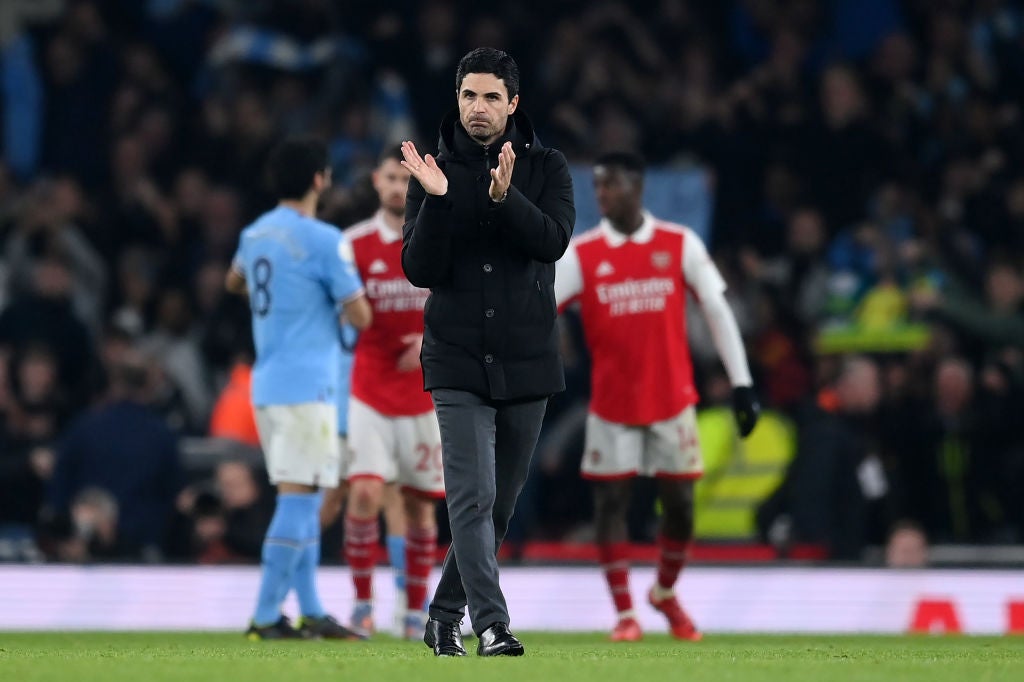
By the time Mikel Arteta returned to the Arsenal dressing room, the players were barely saying a thing. The mood was “down”. Arteta attempted to rouse them by saying they just needed to figure out why they lost in order to improve on it, and “move on”.
A problem is now how the season evolves from here, though. Such was the nature of Manchester City’s victory that it’s impossible not to think this is the start of the end. For the first time this season, though, that fear isn’t just because of the champions’ capacity to go on one of those runs.
It is whether Arsenal now go in the other direction. This 3-1 defeat to City made it one point from three in the Premier League, three defeats in the last four in all competitions and no victories at all in any of this.
It might be a stretch to call it a “rut” yet, especially when elements of this Arsenal performance were still somewhat encouraging, but there is now the danger that it can quickly become one. Arteta now has just two days to prepare for an awkward match away to Aston Villa, and that against his predecessor Unai Emery.
It’s easy to imagine the headlines, and how the momentum can go. That’s what makes it all the more important for Arteta to figure out how they lost here.
Some of it, to be fair, is obvious. Neither manager wanted to admit this was down to experience or one team knowing how to win titles but the game said enough.
City were actually like a vintage Jose Mourinho team in how they went about this. That isn’t in terms of style, but in how they were harder and cannier. There was more nous, not least from the manager and players like Bernardo Silva.
It was still entirely possible for Arsenal’s youthful vigour to overcome that, as a long stretch of the first half showcased. Even Pep Guardiola admitted there was only one team in it for a while, and that wasn’t completely that kind of over-the-top praise he often offers. Arsenal responded superbly to Kevin De Bruyne’s goal and were full value for the equaliser.

They just ran out of impetus as Guardiola himself switched direction with the introduction of Manuel Akanji, and that was compounded by Arsenal’s own personnel issues. They were missing two of their more senior players in Thomas Partey and Gabriel Jesus.
This game meanwhile showed why Eddie Nketiah is at best a replacement option. Arteta didn’t criticise him directly, but he did refer to “big chances”. The striker had two, one just before De Bruyne’s goal, another late on when there was still time to salvage it.
There wasn’t quite the intensity to salvage it, though. City by then had Arsenal at arm’s length.
Some of their players, rather fittingly, chose this game to have their most decisive performances for the club so far. That was particularly the case for the match-winners in Jack Grealish and Erling Haaland.

They produced when it mattered, as Arsenal made the kind of individual errors that come from not yet playing enough games that matter.
It’s also hard not to think that the displays against Everton and Brentford fed into this - not least with how Guardiola used some of Thomas Frank’s approach. He’s still learning even after achieving so much.
This might be a learning experience for Arsenal - perhaps even for this season. There is still more than enough time to recover, as well as potential ructions to this campaign. Many will point to how City showed a “siege mentality” that has come from so many Premier League charges but that doesn’t necessarily go indefinitely, and can gradually start to work in the other direction.
The World Cup could yet have a huge effect we don’t know.
This was all in-keeping with the message Arteta radiated afterwards.
“Psychologically, it’s a marathon,” he said, before pointing to how their only focus should ever be on the next game.
That is now just all the bigger. It makes it all the more important for Arteta to figure out what went wrong in this one.







